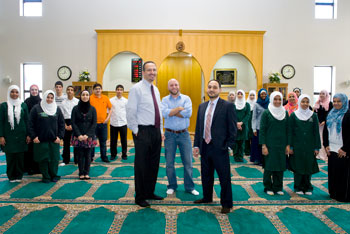
“It’s good for students to interact with others who may not share the same cultural or religious beliefs. It’s good for our students, and it’s good for other teams who compete against us.” – Blair Thorpe, mock trial coach at Salam School, an Islamic school with a 100 percent Muslim student population. Salam School’s mock trial team members flank lawyer-coaches Othman Atta (left) and Munjed Ahmad (right) and teacher-coach Blair Thorpe (center). Photo: Hengen Photography LLC
Standing alone before all seven justices of the Wisconsin Supreme Court, 17-year-old Toby Heytens made his closing argument. It was the championship round of the 1993 Wisconsin State Mock Trial Tournament. Only two teams remained.
Heytens, a member of Superior High School’s mock trial team, was trying to convince the court – which historically judges the final round – that a police officer used excessive force when trying to remove his client from a peaceful protest, causing injuries that affected her ability to receive a piano scholarship to college.
Flash forward 15 years, and Heytens stood alone before a different court, the U.S. Supreme Court, defending the U.S. Equal Employment Opportunity Commission’s (EEOC) regulations and interpretations of federal law as an assistant solicitor general. This time, there was nothing “mock” about it; this oral argument was all too real.
“Mr. Chief Justice, and may it please the Court,” Heytens began with confidence on Nov. 6, 2007. It was a Tuesday. He had little time to make his case. But before the former Superior High School student could continue, he received what SCOTUS blog called a “verbal tongue-lashing” from Justice Antonin Scalia, a renowned lawyer-slayer.
 Joe Forward, Saint Louis Univ. School of Law 2010, is a legal writer for the State Bar of Wisconsin, Madison. He can be reached by email or by phone at (608) 250-6161.
Joe Forward, Saint Louis Univ. School of Law 2010, is a legal writer for the State Bar of Wisconsin, Madison. He can be reached by email or by phone at (608) 250-6161.
“Mr. Heytens, let me tell you going in that my – my main concern in this case, however the decision comes out, is to do something that will require the EEOC to get its act in order, because this is nonsense …,” Justice Scalia bellowed from his lofty perch, staring down at Heytens along with the eight other justices, who undoubtedly expected the young lawyer, seven years out of law school, to deliver a cogent response. He did.
It was the first of six cases that Heytens would argue before the U.S. Supreme Court, far removed from a small Wisconsin town where local judges, lawyers, and teachers helped him and his classmates develop their critical thinking skills as mock trial lawyers and witnesses. If Heytens got his start somewhere, it was here, in Superior, nestled along the shores of Lake Superior in northern Wisconsin. And there is no doubt that high school mock trial put Heytens on a path toward the highest court in the land.
“It’s an amazing activity,” said Heytens, who once clerked for U.S. Supreme Court Justice Ruth Bader Ginsberg. “I got more out of my high school and college mock trial activities than anything I ever did at any point in high school, college, or law school, and it’s not even close. There’s nothing even remotely close.”
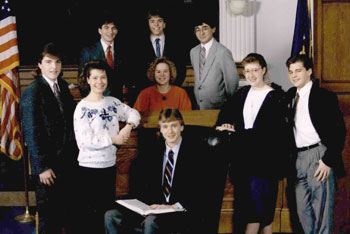
Kelly Thimm (far right), with his Superior High School team in 1990, is now a judge for the Douglas County Circuit Court.
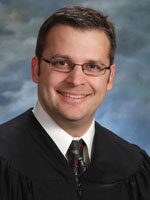
Judge Kelly Thimm
Now a law professor at the University of Virginia Law School and head coach of Virginia’s undergraduate mock trial team, Heytens still recalls the moment he stood before the Wisconsin Supreme Court as a teenager in 1993.
“It was the coolest thing that ever happened to me,” said Heytens, who went on to help start a collegiate mock trial program as an undergraduate student at Macalester College in St. Paul (one of the students he recruited for the team became his wife).
Arguing before the Wisconsin Supreme Court as a high school kid was the first of many legal highlights for Heytens. But for all his wins and successes, he still remembers the one loss that slipped away: He could not carry his high school team to a mock trial championship. Superior lost to Rhinelander High School. Perhaps this loss stoked an inner fire to succeed, if not an opportunity to reflect on how to win future cases.
“In mock trial, you literally cannot win by yourself. You are going to win or lose this activity as a team. Mock trial certainly made me much better at learning how to get the most out of myself and other people,” Heytens said. “It’s an extraordinary activity.”
Heytens’ career provides a shining example of professional success that started with high school mock trial in Wisconsin. But there are countless other examples involving mock trial students who went on to be successful in law and other professions and industries. We highlight some of them here, as well as the teachers and lawyer-coaches who helped them succeed. Since 1983, the year of its inception, mock trial has helped more than 30,000 Wisconsin students instill useful skills and lifelong memories.
“I remember thinking, ‘this is what I was meant to do.’”
 – Richard Sullivan, assistant district attorney in Rock County the last 17 years. He won the Illinois High School Mock Trial Tournament with Marion Central High School in 1987.
– Richard Sullivan, assistant district attorney in Rock County the last 17 years. He won the Illinois High School Mock Trial Tournament with Marion Central High School in 1987.
It was the school’s first year in the competition, and the school has never fielded a team since. Sullivan’s small-town team beat major Chicago-based high schools to win the state title and went on to the National Mock Trial Tournament in Washington, D.C.
“We argued against the Mississippi team. I remember sitting in the courtroom, and there was some downtime. I remember looking around the courtroom and realizing that this is what I wanted to do. I remember thinking, ‘this is what I was meant to do.’”
The Early Days
If the Wisconsin High School Mock Trial program is a large river running through Wisconsin, then retired Superior lawyer Ken Knudson is among the headwaters, the river’s origin. Not only is he a mock trial pioneer, he coached thousands of students over the years, including Toby Heytens.
In 1977, Knudson was practicing law in Superior. At a local bar meeting, the president mentioned that a Superior High School teacher, Bill Rehnstrand, wanted ideas for a Law Day project. “I raised my hand and it changed my life, literally,” Knudson said.
Knudson suggested the high school run a mock trial event. “We got the local judge to hear the trial, and we did that for the next five years.” When the State Bar announced plans to run a statewide legal education program for high school students in the early 1980s, Knudson was there. He invited a State Bar representative to observe Superior’s mock trial event. “They set it up like we were doing it, and the rest is history,” he said.
For more than 30 years, Knudson served as mock trial lawyer-coach at Superior, along with Rehnstrand as teacher-coach. Both oversaw thousands of students and watched as they developed confidence in public speaking, critical thinking, and problem solving, as well as knowledge about the law and the judicial system.
“A lot of the kids that got involved weren’t going to be lawyers. But for a lot of them, it still had a profound effect on their lives,” said Knudson, who recently retired. “To be able to communicate and think on your feet, these are skills that transfer to any career.”
“Mock trial teaches students how to think differently, how to formulate an argument, and how to interact with other people.”
– Melissa Schall, a science teacher and mock trial coach at Dodgeland High School in Juneau.
Schall was a mock trial participant at Dodgeland from 1992-96, and now coaches with the lawyer-coach who taught her, Joe Moore, a retired public defender who started Dodgeland’s program 27 years ago.
Schall said Dodgeland is lucky to be located in the county seat. Moore, in his public defender days, took students to watch his trials, Schall said, and local judges like former Dodge County Circuit Court Judge Daniel Klossner would open the courtroom for practices and let students watch proceedings, sometimes sitting in the jury box.
“Watching them grow as thinkers, that was the most memorable for me,” Knudsen continued. “It was incredible to watch the work they put in, and the results they could achieve. Often, kids come back and say mock trial was the most important thing they did in high school, in terms of learning to think, speak, and organize their thoughts.”
Don’t Count Us Out
Now a judge for the Douglas County Circuit Court, Kelly Thimm recalls his time as an early mock trial participant at Superior High School under lawyer-coach Ken Knudson’s guidance. Judge Thimm participated for three years, starting as a sophomore in 1987.
The year before, in 1986, Superior had won the state mock trial championship and took second place at the national tournament in Phoenix, the best finish for a Wisconsin school to that point. Needless to say, returning members of the 1986 team were confident in their ability to perform at a high level. Thimm was on the lowly sophomore team, competing against Superior’s experienced junior and senior teams.
“Nobody gave us much thought,” Thimm said. “But we ended up beating both our junior and senior teams at the regional tournament in Eau Claire to qualify for the state tournament. As you can imagine, it was a very quiet bus ride home. I don’t think the junior and seniors were too happy that a younger team had beaten them.”
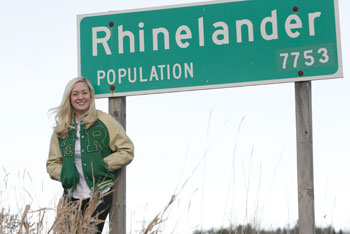
Amy Ferguson, who helped Rhinelander win two state titles in 2004 and 2005, is now a criminal defense lawyer at O’Melia, Schiek & McEldowney S.C. in Rhinelander. Photo: TJ Gaffney Photography
Thimm said a combination of naiveté and hard work let the sophomore team believe it could beat anyone. And that sort of confidence helped carry the day. True teamwork prevailed, though, as the junior and senior teams helped them prepare for state.
Thimm, like most high school students, wasn’t sure what he wanted to do in life. But mock trial gave him a glimpse of a life in the law. “Mock trial was the catalyst,” he said. “I’m not sure I would have taken that career path if I did not participate in mock trial.”
Thimm went on to graduate from U.W. Law School and worked for the Douglas County District Attorney’s office for almost 13 years before his election to the bench in 2009.
Putting the Pieces Together
Mock trial has helped shape the lives of countless students since the 1980s. Some go on to be lawyers, many do not. But the experience can only be described as positive for those students who learn skills that help them throughout their careers.
Wisconsin Hosts 2014 National Mock Trial Tournament in May. Legal Community Asked to Donate Funds.
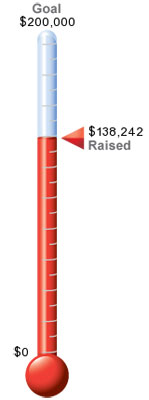 Wisconsin has been chosen to host the 2014 National Mock Trial Tournament in Madison, May 8-10, 2014, and the State Bar of Wisconsin is asking for the legal community’s help in raising at least $200,000 to make the event a true success.
Wisconsin has been chosen to host the 2014 National Mock Trial Tournament in Madison, May 8-10, 2014, and the State Bar of Wisconsin is asking for the legal community’s help in raising at least $200,000 to make the event a true success.
State champion high school mock trial teams from more than 45 states will compete, including the eventual 2014 Wisconsin state mock trial champion, to be decided in March.
Thousands of students, teachers, lawyer-coaches, and parents will descend on Madison for the three-day event, with competitions in courtrooms at the Dane County Courthouse and selected rooms at the Wisconsin State Capitol. The championship round will be held in the historic courtroom of the Wisconsin Supreme Court, judged by all seven members of the court.
Wisconsin last hosted the National Tournament in 1992, more than 20 years ago. Through a competitive bidding process initiated by the State Bar of Wisconsin, the Badger state will once again host this prestigious event.
“Wisconsin has had one of the most active mock trial programs in the country, and over the years, has been a top competitor at nationals,” said Appleton attorney Kevin Lonergan, chair of the National Mock Trial Executive Committee. “Bringing nationals to Wisconsin is an extension of that commitment to mock trial. The national competition will give us the opportunity to showcase our state and let the country see our commitment to the next generation.”
The State Bar is working hard to provide a highly memorable tournament for the qualifying teams. The effort requires donations to secure the venues and amenities necessary to be a welcoming, top-notch host. Many generous contributions have trickled in already, but more donations are needed: the State Bar has raised $138,242 of the estimated $200,000 necessary to make this event a true success.
“The honor of bringing nationals to Wisconsin carries with it the responsibility to host a competition that will make us proud,” Lonergan said. “Several states that have preceded us have spent 50 to 100 percent more than what we have budgeted. We need money for materials, facilities, social events, banquets, meals for volunteers and participants, and much more. Despite having one of the smallest budgets in the past several years, we unfortunately have not yet received the financial support that we need to host the event.”
“One of the best parts of these tournaments is the chance to meet kids from other states,” said Amy Ferguson, an attorney in Rhinelander who participated in the 2004 National Mock Trial Tournament in Orlando, Fla., as a high school student. “We were able to meet other students at social functions and other events, and that’s a really fun part of it. The more support we can get from lawyers and the community, the better the experience will be for the students involved.”
As we hit the home stretch, consider how this once-in-a-lifetime opportunity will affect the high school students who have worked hard to get there. And consider how your contribution will help show the nation what Wisconsin’s legal community is all about.
Donate Now
To learn more about the National Mock Trial Tournament and to donate online, visit nationalmocktrial2014.wisbar.org.
Checks can also be made out to the Wisconsin Law Foundation and mailed to: State Bar of Wisconsin, P.O. Box 7158, Madison, WI, 53707-7158.
“Mock trial was probably the most formative confidence-building experience of my young life,” said Abby Bar-Lev, who participated in mock trial at Nicolet High School in Glendale from 2002 to 2004 under lawyer turned high school teacher Phyllis Santacroce. Bar-Lev, who recently graduated from the University of Pennsylvania Law School, is now a lawyer for a nonprofit organization in Washington, D.C. “I learned how to take a really complicated problem, separate it into all of its pieces, and then put it back together in a way that made sense for the story I wanted to tell,” she said.
In her sophomore year, Bar-Lev and her teammates had to make sense of a case involving three teenage boys who skipped prom to drink beer in “Sean Lawton’s” basement. His parents weren’t home. At some point, Lawton grabbed his parent’s gun, which was stored upstairs, and began playing Russian roulette. “Lee Smid” ended up dead.
Bar-Lev’s team took the case to the finals of the regional tournament against Shorewood High School, her fondest memory of mock trial. “Shorewood ultimately won in a tiebreaker, but it was a tremendous experience,” Bar-Lev said. “We beat some of the teams that had won for years. It affirmed that if you work really hard and dedicate yourself, you can be successful. And that’s a great lesson to learn in high school.”
Along the way, Bar-Lev learned the elements of negligence to argue who was at fault in the death of Lee Smid. “When we studied negligence in torts class years later, I remembered the elements and how to apply them. It came up on the bar exam, too. Mock trial isn’t just a game. You learn the law, which others aren’t doing at age 15.”
Bar-Lev says she still thinks about mock trial quite often, almost every day. The lessons she learned there helped in her legal education and now help her work with lawyer-colleagues on complicated material, she says. “It’s so valuable to go through a mock trial program. No other intellectual group exercise forces you to work collaboratively in this way, to be articulate, trust that you are prepared, and problem-solve on the spot.”
A Dominant Force
You can’t talk about mock trial in Wisconsin without mentioning Rhinelander High School. The Hodags’ mock trial team won their first state title in 1988. The following year, in 1989, Rhinelander took the state title again, and went on to win the National Mock Trial Tournament in Louisville.
The 1989 team is the only Wisconsin squad to win the national championship to date, although Rhinelander’s 2004 team took second at nationals. In all, Rhinelander has won 16 state championships in the past 30 years, amassing 10 titles since 2000. Rhinelander enters the 2014 state mock trial tournament as the defending state champ.
So what makes Rhinelander such a powerhouse? It starts with Rhinelander’s mock trial teacher-coach, Kathy Vick-Martini, who has coached the team every year since 1983. “She’s dedicated, she’s smart, and she’s very passionate,” said attorney Amy Ferguson, a former Rhinelander High School mock trial participant.
As a witness, Ferguson helped Rhinelander win two state titles in 2004 and 2005. The 2004 team took second at nationals in Orlando, competing at the Orange County Courthouse where the infamous Casey Anthony stood trial for her daughter’s death.
“We also had great attorney coaches,” said Ferguson, now a criminal defense lawyer at O’Melia, Schiek & McEldowney S.C. in Rhinelander. Ferguson was referring to retired public defender Jim Jacobi, along with co-coach Mike Bloom, now a circuit court judge in Oneida County. Both have coached the team for more than 20 years. Jacobi attends practice every day, and Bloom judges students in scrimmages on the weekends.
Vick-Martini, who retired from teaching but continues to coach the high school mock trial team, says the consistent contributions of Jacobi, Bloom, and other local lawyers and judges have helped Rhinelander become a state and national powerhouse.
“For a lot of years, we were just willing to work a lot harder than other teams,” she said. “We met every day and every weekend. We aren’t the only ones doing that now. Our success now has a lot to do with the fact that we get such good advice from lawyers.”
Vick-Martini recalls the 1989 National Mock Trial Tournament in Louisville. Her oldest son was on the team that year. Rhinelander faced the California state champion in the finals, a team whose high school population was larger than that of the city of Rhinelander.
“There were 15 judges, and we won a unanimous verdict. That’s unheard of,” she said. “We were just this small-town team from northern Wisconsin. Sometimes students from small rural communities wonder whether they can hold their own against students from big cities and big schools. And they come realize that they absolutely can.”
“Our kids are getting into some of the best colleges in the country and crediting their involvement in mock trial with their ability to do that,” Vick-Martini said. “I don’t think there is a better extracurricular activity available to students than mock trial.”
Aside from the skills that students learn and the benefits that students can derive from the activity, mock trial also creates memorable moments and memories.
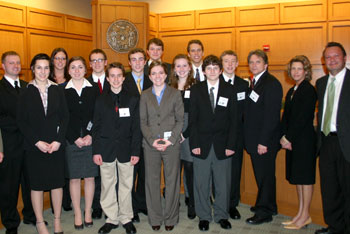
Green Bay East High School mock trial team at the 2010 state tournament. From left: lawyer-coaches Beau Liegeois (first) and Colleen Nordin (third), and student Katherine Greatens (fourth). From right: lawyer-coaches Randy Gast (first) and Elizabeth Kremer Flanigan (second).
Ferguson said the national tournament in Orlando was the highlight of her mock trial career. “We had judges telling us, and other teams too, that we were more prepared than some lawyers they see in their own courtrooms. This is a really great thing to hear as a high school student, and something you remember for the rest of your life.”
Bridging Communities
Each season, between 105 and 120 schools participate in mock trial, hoping to make one of just 12 slots at the state tournament. While much time is spent preparing in-house through intra-squad scrimmages and practices, regional and state tournaments bring schools together, allowing students to meet, compete, and mingle.
Students from big schools meet students from smaller ones. Students from rural schools meet students from urban and suburban ones. And while students may have different religious, cultural, or socioeconomic backgrounds, they share a common goal: learn the law; articulate the arguments; speak with confidence; win the case.
Blair Thorpe is head of the social studies department and mock trial coach at Salam School, an Islamic educational institution with a 100 percent Muslim student population. He says mock trial helps students experience other cultures they might not otherwise.
“For Green Bay East High School to be competitive in mock trial shows that talented students can come from anywhere.”
– Beau Liegeois, assistant district attorney for Brown County.
Liegeois has served as a lawyer-coach to Green Bay East’s Mock Trial Team since 2009. The school, situated in an urban part of Green Bay, is economically and racially diverse. The team won the state title in 1984 and most recently qualified for state in 2009, 2010, and 2011. “Green Bay East is unique compared to some of the teams that normally make it,” Liegeois said.
Liegeois says he’s coached many talented students in just his few years. For instance, Katherine Greatens was a member of the 2010 team that took third place at the state tournament. Liegeois said Greatens was one of the best witnesses in the state. She played a geologist, a psychiatrist, and a social worker as a member of the varsity team.
“She came up with answers that were logical and consistent throughout the entire testimony and during cross-examination. The ability of a witness to maintain their composure on cross-exam is a huge factor for points, and there was nobody better than Katherine,” Liegeois said.
Greatens, now a part-time student at UW-Green Bay, has found mock trial a help in the working world. She is working full-time as a file clerk in the Brown County District Attorney’s Office.
“Katherine’s familiarity with the legal process is a huge asset for what she does in our office,” said Liegeois, who credits mock trial. “She knows what happens in court and why we need certain information.”
Greatens says she wouldn’t have been interested in the job if not for mock trial. She’s still weighing her career plans, but said “mock trial will certainly help in whatever I decide to do.”
“It’s good for students to interact with others who may not share the same cultural or religious beliefs,” Thorpe said. “It’s good for our students, and it’s good for other teams who compete against us. It gives everyone an opportunity to experience other cultures.
“It prepares them for a world rich in cultural and religious diversity,” Thorpe said. “At the same time, these are all just talented high school kids trying to have fun. And mock trial is a great vehicle, because they are learning to be confident speakers and thinkers.”
In addition, Thorpe says, mock trial has given his students confidence in knowing that preparation and hard work is a true equalizer. Thorpe founded Salam School’s first mock trial team for the 2010-11 school year and his students were not optimistic.
“The common attitude was that our school was too small to be competitive against bigger schools,” Thorpe said. “But after our first scrimmage against another school, they realized they could compete. They realized that success hinges on how they prepare and use their minds, not the size or location of the school they are competing against.”
Now entering its third year, Salam School is hoping to make a run at the regional tournament. The school has two teams that practice twice a week, but students pushed Thorpe to add an extra day of practice, he says. Lawyer-coaches Othman Atta and Munjed Ahmad, both Milwaukee lawyers, attend every practice.
“We certainly owe a lot to our lawyer-coaches. They are the heart and soul of this team,” Thorpe said. “They consistently direct our students down the right path, without doing the work for them, which is always the goal in teaching. And they explain complicated concepts in a way that’s understandable.”
Salam School, along with other newcomers and underdogs, could be the “Cinderella” story of 2014. It’s like Abby Bar-Lev said: “If you work really hard and dedicate yourself, you can be successful.” Powerhouses like Rhinelander will continue to set the bar high.
Students who make state will have an opportunity to argue before the Wisconsin Supreme Court, something many Wisconsin lawyers only dream of. And the reward will be particularly sweet for this year’s state champion: they’ll be the host team at the 2014 National Mock Trial Tournament, which will be held May 8-10 in Madison.
Mock trial participants, win or lose, will use the mock trial experience to do great things in life, and they’ll have lifelong memories, too. Maybe, one day, they’ll end up arguing before the U.S. Supreme Court, just as a small-town kid from Superior went on to do.
